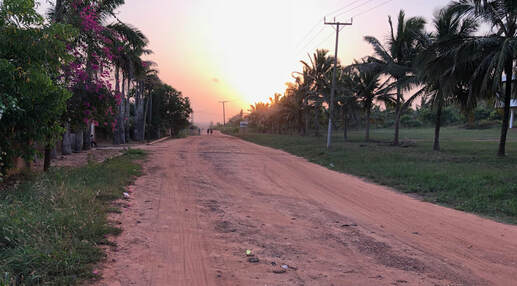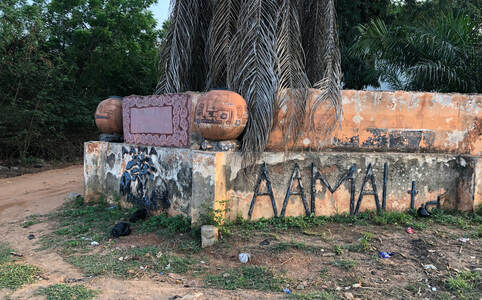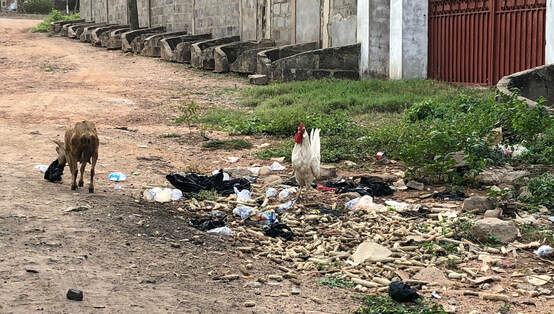|
By two days into my stay in Ghana, I was loving being back there. I still simply loved Ghana – or maybe it was just Africa in general, but either way, there was just so much to love about being there. It felt amazing to return to the slower pace of African life – no hustle, no busy-ness or rush – this is simply not the way it is there. Coming from America, or from the Western world in general, to me life feels generally relaxed in Ghana, and less complicated. There is a certain EASE to life there, which seems very much wrapped up with the mentality of the people, the cultural mindset. This was all so much of what I had loved about living there and what had made me want to live there, and now it was so easy to sink right back into it, and it felt so refreshing to do so. Not to mention the fact that it was warm, and there was moisture in the air, and it felt so much easier (especially coming from the cold of Munich) for a body to be in this environment.
As for Ghana in particular, as compared to most other countries in West Africa, it was so easy for me there because of the language, as most people speak English, or at least some. (Though it’s been on my to-do list for years, ever since becoming interested in traveling more widely within West Africa, I unfortunately have yet to learn French.) Of course, one needs to be able to communicate in order to tap into the cultural mindset, or to be able to interact enough to feel that you exist within the culture rather than just alongside it. But what I appreciated most about the lack of a language barrier in those first few days back was that it also meant independence. This was important to me – that I could function on my own here, was not dependent on a host or a guide. If I needed something, I could go ask the women at the “market” along the road, and they, or more often their kids, would help me find whatever it was I was looking for. I also loved that this could easily turn into a small adventure – you ask one woman if she knows where you can find something and then get led to four different places by four different people before finally you get it – plus many nice interactions along the way! My independence played a big part in the way I was feeling – so free, so activated. And I knew, too, that my past there was also playing a role in the way I felt now – in some way, I did still know Ghana, and that made me feel very comfortable there. All in all… I just felt so very happy inside. I realized that it wasn’t even necessarily the fact of being in the environment of Ghana that was doing it, that it might have had just as much or even more to do with something inside of myself – something that had clicked into place now – now that I finally made it back, as I had just known for so many years I needed to do. But whatever it was… so very happy inside… * * * By three days in, I was ready to take my first walk down towards the area where I used to live. It’s about a twenty minute leisurely walk down the road from Kokrobite, and as I ventured along, I continued to be amazed at the changes in the area – now at all the huge structures that have gone up. One massive, modern, multi-story edifice had big signs on the side reading, “APARTMENTS & HOMES, SHORT & LONG TERM LEASE, AVAILABLE NOW, STUDIO – 3 BEDROOMS” – and this just looked so bizarre to me! This kind of thing simply did not exist here, in any form, eighteen years back; my travel buddy and I had been lucky to find a little bungalow to rent by word of mouth. For the most part, though, all of these giant structures, so many that I passed along the main road, which all looked quite new, also looked completely empty. It was as if the village was trying to move in a certain direction, but it wasn’t quite there yet. What had stayed the same, and now felt comforting in its sameness, was the land itself, the beautiful red-brown of the earth here. And there were still the ever-present chickens and goats wandering about pecking and nibbling at it, finding scraps of food amongst all the trash. …Ah yes, the trash. The plethora of trash, predominantly plastic, was another thing that had not changed; always a part of the landscape here, it still lined every road or path, and was scattered just about everywhere as well. Nor had there been any change in the standard method of trash removal – burning it, plastics and all. I had had a long talk the day before with an Italian man who has had a restaurant in Kokrobite since before my last stay there, and in the midst of talking about all the changes that have taken place in Ghana, he and his wife were saying that, after trying all these years, they just can’t get the people to understand about not burning the trash… I saw several piles of trash burning now, as I passed through patches of smoky air, and I wondered whether the haze in the sky was from some climatic source or from the sum of so many small fires burning throughout every village in the area… Moving at a slow pace further and further down the road towards AAMA - the Academy of African Music and Arts, feeling my surroundings, taking this all in, I began to feel sudden waves of emotion rising up within me, lifting my stomach towards my throat for a second or two, just long enough to let me know they were there, to make me feel my heart beating suddenly a bit harder, and to make me wonder. This undefined raw emotion was tinged with a sense of “whoa, what-am-I-doing” – the same wary sensation that had occasionally fallen over me on the day that I traveled from Munich to Accra; and spontaneous tears now began to pop up just as they had done a few times that day as well. AAMA was the one big structure – or compound of structures, really, all whitewashed and grand – that had been here before. It had been a hotel/drum and dance school, and it was what had originally led me to Kokrobite. I had not wound up studying music or dance there, as their lessons were pricey, but I had found that the members of the group that both taught and performed there also taught at a much more reasonable price at another space they had in Kokrobite (where I had also found more reasonably-priced accommodations). AAMA had been pricey in general, and there never seemed to be very many people staying there, but the free drum and dance performances they had offered on the weekends in their little outdoor theatre had always drawn a small crowd. After I had married Koro, I sometimes went there to sit and do writing or editing work at a sheltered table that overlooked the beach – a quiet spot where I found I was never disturbed. This was before Koro and two others completely rebuilt the shack in a more waterproof manner before the start of the rainy season, and then used the excess scrap wood to build me a table and a stool; and though I had never minded, or even really noticed, our lack of furniture, I surely did relish the occasional outing to sit at this table – walking down the path with my bag full of notebooks, it felt like the equivalent of going to work at a library or a coffeeshop back in the States. I had discovered this spot when Koro had taken me to AAMA’s relatively private, unfrequented beach shortly after I had moved in with him, telling me that if I wanted to go to a beach, this was where I should come. He felt that I would be safe and undisturbed within AAMA because we had a special connection there – one of the night watchmen, Assibi (or Bra Assibi --> BraSibi), was his closest friend around these parts – and it seemed that to Koro this meant we were a part of AAMA’s extended family, and therefore had rights to be there. “We can never forget BraSibi,” Koro would often say, as BraSibi was the one person who helped us with every single minute detail with which we could possibly need help in our lives out in the bush. He was also there for the bigger events – he came with us to Accra’s City Hall to be the witness at our legal wedding, he was the one who had to inform me of Koro’s passing, and it was his home in which I stayed during my first few nights back in Ghana after losing Koro. (If I haven’t mentioned this before, I was in the States, in Maine, when Koro passed.) BraSibi also cared for me when I eventually got sick (malaria Round Three) during that post-Koro trip. And he was the one person in Kokrobite whom I had thought, before embarking on this current trip, that I would like to somehow find. But the only place I had ever known in which to find BraSibi was AAMA, where he had lived with his wife and children in the workers’ quarters, and I knew from researching Kokrobite on the internet when planning my trip that AAMA was no longer up and running. Now it was shocking to see the crumbling state of ruin in which I found it. Yes, AAMA, which used to seem so relatively grandiose out here, is now in ruins. I ventured inside the property and walked a bit through the paths that remain – while the land around them was completely overgrown, many of the paths through the site were still clear. But it felt a bit… eerie. I saw some clothes hanging out on a line near one of the run-down and empty-looking buildings – so it seemed there must be some squatters at least somewhat living in there. And I did come across a few other people passing down the paths on their way towards the beach. It was a Sunday, though, a weekend, when the area in general becomes more populated with visitors from Accra and other areas, and these folks did not look very local. Eventually the eeriness got to me and I meandered my way back out. Koro and I had lived out in the bush directly across from AAMA – on the other side of the main road from Kokrobite; there had been an overgrown road (back then two tracks with grass growing high through the center) leading out into the bush in which just a handful of us were residing. Before I moved in that direction, though, I walked a bit further up the main road, only because the pavement had stopped at AAMA and it now felt so heavenly to walk on the wide, red dirt road, with much less traffic, in the peace and quiet, watching the big orange sun about to set directly in front of me – this was how it used to feel to walk along the road from Kokrobite. Now there was no peace and quiet along most of the length of the road up to this point, with most of the noise coming from traffic and from the occasional bar pumping out recorded music at a deafening pitch – and with all the dust and exhaust from the passing traffic as well, I found it difficult to entirely enjoy walking along Kokrobite’s “new and improved” paved road. But time was running short – the sun would very soon perform its descent’s swift finale, and I wanted to make it back to Kokrobite before dark. So I hurried back to have a look down the road across from AAMA, the road that used to lead to the path that then led to our site. …But now there were three roads turning off from the main road, heading out across from AAMA – one at each end of AAMA’s sprawling property and one across from its middle. I was pretty sure our road had been the middle road, but I wasn’t positive. Hurrying because of the limited daylight, I made it just a short way up the middle road before I was stopped by a young, lounging Rasta brother, sitting in a little structure with a couple of friends, who (typical) wanted nothing more at this moment than to chat my ear off and get my phone number. After finally freeing myself – without being too impolite, I went just a touch further, looking at the big cement houses on either side of me, and at the cement walls dividing up the land that used to just be uninterrupted bush – only dotted here and there with a few other small structures besides ours. The sun was falling, nearly gone now. I stopped and gazed up the road a while, wondering. …And then I decided that I wasn’t ready for this, and that time was too short, and that I would come back again, and that this was definitely enough for today. * * * Writing in my journal that evening, in the midst of reflecting on how, while it had been so heavenly to be down there where it was quiet, and closer to home, this was not my home anymore, and how I had stayed long enough the last time to feel, by the time I left, that a Kokrobite without Koro was no place for me… I thought about how a lot of what I had been feeling was how I have moved on, and how my life is no longer here. Maybe my heart – or part of my heart – was left here, I wrote, recalling that feeling of reunion that I had had at the beach at the end of my first day back, and maybe I just needed to come pick it up, but beyond that… I feel so… done. Later that night, when I couldn’t sleep, I found myself writing to Koro… Koro, I want to put this all behind me, I wrote. Of course YOU will always be with me – I know that will never change; I still feel your love, as always… But this – Kokrobite, Ghana, the pull on my heart to be here, the draw here… it’s time to lay it to rest… My whole desire to be in Ghana, that persisted for years after you passed… that is what I want to lay to rest. The desire to create a future for myself here has passed – has probably long since passed, but I must have needed to come to really experience the fact that it truly has. Yes, I am always open to new possibilities, to exploring whatever direction the Divine provides, but right now… I feel like the direction is out of here. …I am so thankful I have finally come. I needed to come, and I’m not done yet – I know I need a bit more time out near – or very hopefully at – our old site. And yes, it feels wonderful, in many ways, to be back in Ghana, back in Africa, and that is something for which to be thankful. But what I feel even more thankful for, in this moment, is the feeling that I can lay my life here, my past here, to rest. And I can’t even describe to you what that means. I just know that I feel it.
0 Comments
Your comment will be posted after it is approved.
Leave a Reply. |
AuthorAharona Shackman has used writing as her primary practice for connecting with the Self pretty much since she learned to write. With the commencement of this blog, she is now beginning to practice the sharing of some of her writing... Categories
Archives
September 2020
|
Proudly powered by Weebly


